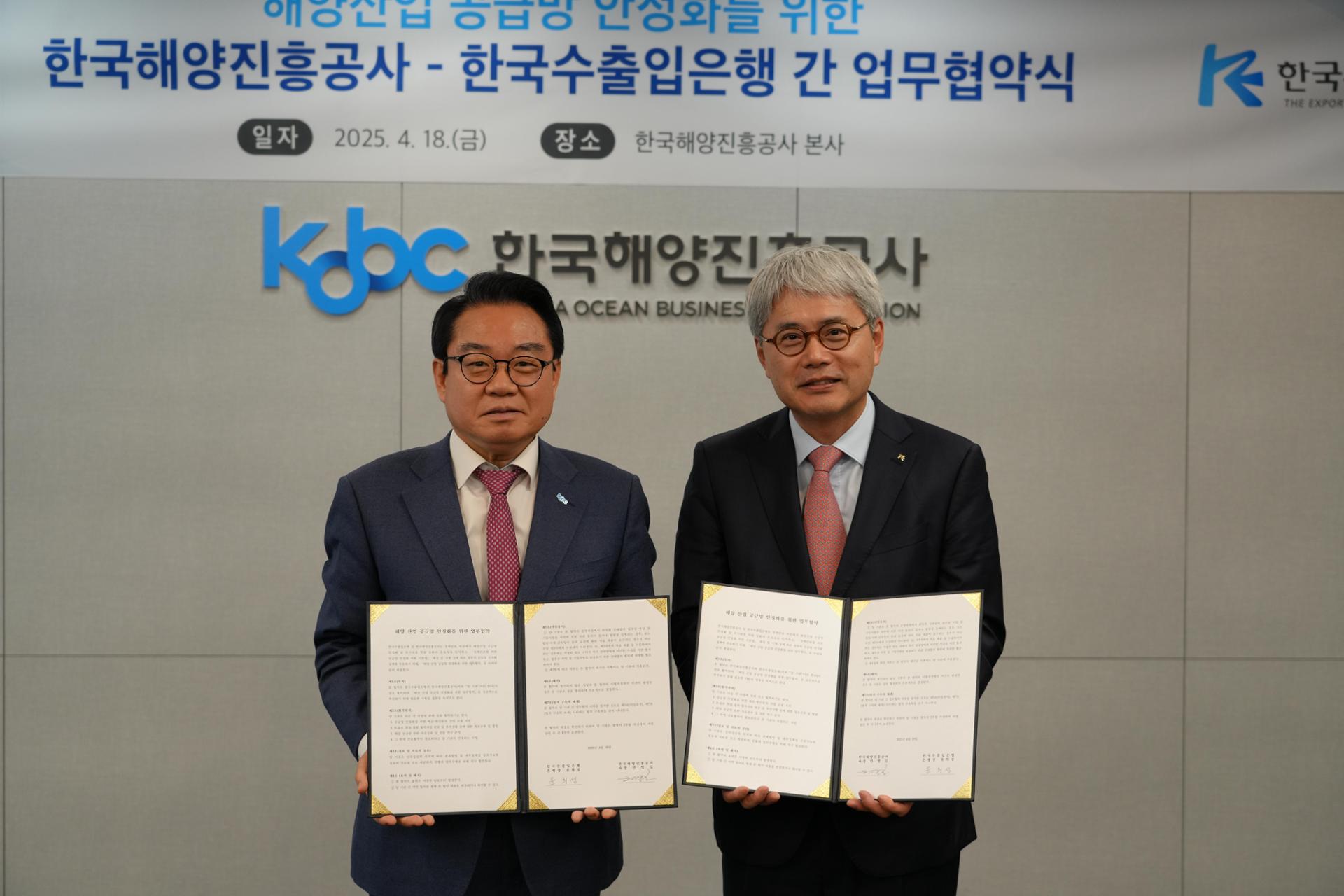
Eximbank signs agreement with KOBC to strengthen Maritime Supply Chain
SEOUL : The Export-Import Bank of Korea (Eximbank) announced on Sunday, April 20, 2025, that it has signed a significant business agreement with the Korea Ocean Business Corporation (KOBC) aimed at stabilizing the maritime supply chain. The agreement was finalized on Friday, April 18, 2025, at KOBC’s headquarters in Busan, marking a pivotal step in enhancing the resilience of Korea’s shipping and port logistics industries.
This partnership outlines a collaborative approach to providing financial support specifically tailored for the shipping and port logistics sectors, which have been under increasing pressure due to global supply chain disruptions. The two institutions will work together through a newly formed task force known as “K-Logistics,” which will focus on sharing information, conducting joint research, and exploring potential projects to bolster maritime infrastructure.
Eximbank has committed to prioritizing financial assistance for critical areas such as shipping, logistics, and maintenance, repair, and operational (MRO) services, which are essential for the smooth functioning of vessels. This initiative is backed by a substantial 10 trillion won (approximately $7.02 billion) supply chain stabilization fund approved earlier in February 2025. The MRO sector, in particular, plays a crucial role in ensuring the safety and reliability of maritime transport.
Yoon Hee-sung, President and CEO of Eximbank, expressed optimism about the agreement, stating, “We expect this agreement to serve as a foundation for stabilizing supply chains and strengthening the global competitiveness of Korean companies in the shipping and port logistics sectors.” He further added, “We hope that the exchange of expertise and personnel between the two institutions will contribute to building a robust framework for identifying support projects and expanding financial assistance.”
In a parallel development, the shipping industry is witnessing a transformative collaboration between two maritime giants, Denmark’s Maersk and Germany’s Hapag-Lloyd, through their newly launched “Gemini Cooperation.” This groundbreaking operational partnership aims to reshape sustainable shipping practices globally.
The Gemini Cooperation represents a strategic pooling of resources and fleet integration to create a fast, flexible, and interconnected ocean network with a focus on reliability and sustainability. Ships began phasing into this new network in February 2025, and the entire fleet is expected to be operational under Gemini schedules by June 2025.
With around 340 vessels and a combined capacity of 3.7 million TEUs (twenty-foot equivalent units), the Gemini network is set to significantly improve shipping efficiency. The innovative “hub and spoke” structure of the network allows vessels to bypass congested ports, facilitating quicker cargo movement and minimizing delays that can disrupt global trade.
The shipping industry is vital for international commerce, accounting for approximately 80% of the world’s goods transportation. However, it also faces scrutiny for its environmental impact, contributing about 3% of global carbon pollution. Alarmingly, the industry’s carbon emissions have surged by 20% over the past decade, as highlighted in a recent U.N. report.
The Gemini Cooperation aims to counter these challenges by optimizing shipping routes, which will not only enhance transit times but also reduce congestion and layover durations. This initiative aligns with broader industry trends toward greener practices, as fewer port calls and optimized vessel utilization are expected to lead to reduced emissions.
Moreover, the partnership is committed to exploring the transition to cleaner energy sources, including biofuels, methanol, and hydrogen-powered ships. Currently, a staggering 99% of shipping fuel is derived from oil-based fossil fuels, underscoring the need for a shift towards more sustainable alternatives.
Johan Sigsgaard, Chief Product Officer of Ocean at Maersk, commented on the initiative, stating, “Over the last year, we have carefully planned this to ensure that all our customers experience a smooth transition into the new network. With its innovative design, we believe our customers will benefit from increased reliability, flexibility, and more competitive products.”
As these two significant agreements unfold, the maritime sector is poised for a transformative period that not only focuses on stabilizing supply chains but also emphasizes the importance of sustainability in shipping practices. The collaboration between Eximbank and KOBC, alongside the Gemini Cooperation between Maersk and Hapag-Lloyd, signals a commitment to enhancing the global competitiveness of the shipping industry while addressing pressing environmental challenges.
These initiatives reflect a broader recognition within the maritime community that resilience and sustainability must go hand in hand to navigate the complexities of global trade effectively. As the world continues to grapple with supply chain disruptions and climate change, the actions taken by these organizations may serve as a blueprint for future collaborations aimed at fostering a more robust and environmentally responsible shipping industry.

